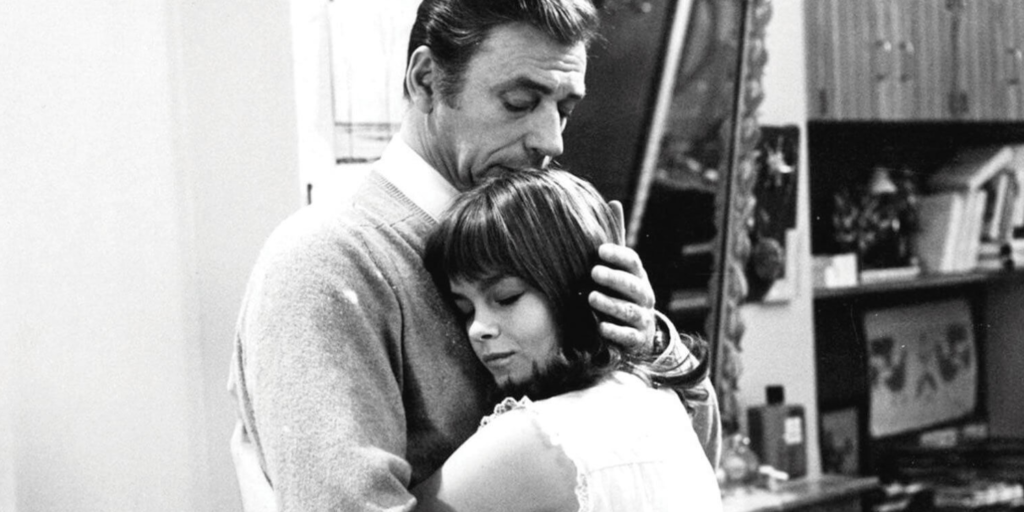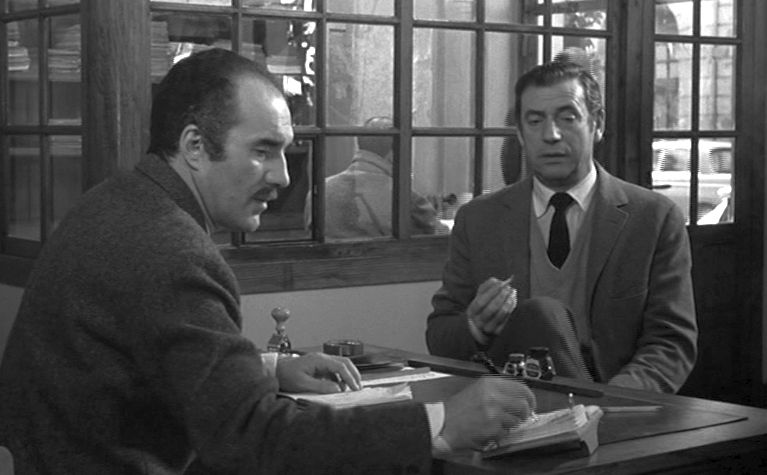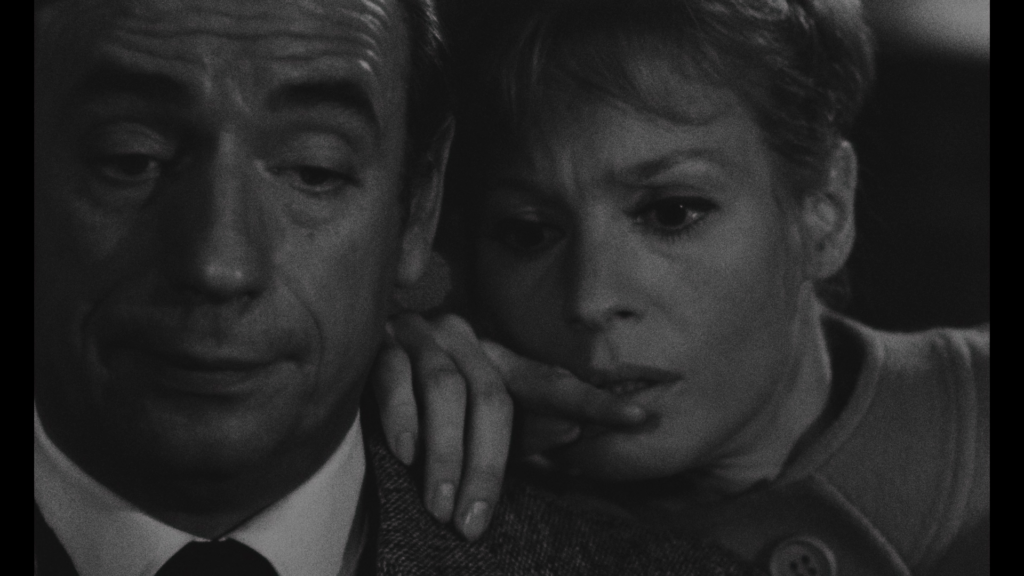| MH Rowe |

La Guerre est finie plays at the Tyrlon Cinema from Friday, August 20th, through Sunday, August 22nd. Visit trylon.org for tickets and more information.
In film, physiognomy is destiny. Because this is so, the face of Yves Montand is perfectly suited for a destiny shared by so many men and women in mid-century dramas, from Hollywood and beyond: being tired. The tiredness of Montand in Alain Resnais’s La Guerre est finie (1966)—not to mention his doggedness—is like Humphrey Bogart’s exhausted vigor. Montand may not have Bogart’s bug-eyed electricity; he’s smokier and silkier. He and Bogart do share a natural pout, however, a droopy or sleepy look that accents a handsome face. Their blink is slow; they’re pensive smokers. What Montand shares with Bogart onscreen is the sense that he’s a weary operator and man of grace and dignity, not to mention professional composure, all of which he maintains nearly at the cost of his soul in a world that would strip anything from anyone for the right price—and sometimes, not even for a price. Sometimes, it is for an apparent good cause.

A more conventionally told narrative than his first four features—among them the celebrated Hiroshima Mon Amour (1959) and Last Year at Marienbad (1963)—Resnais’s La Guerre est finie is a perfect film for a tired man. Montand plays Diego Mora, who goes by many aliases in his work as a professional revolutionary. Living out 25 years of exile in Paris after Franco’s military coup in Spain, Mora travels to and from Madrid, Barcelona, and other Spanish cities working with leftist agitators and anti-fascist revolutionaries. He and his small cadre of expatriates, who have all been living in France for twenty years at least, distribute illegal publications criticizing Franco’s regime and, from a distance, plan and organize strikes and demonstrations. Their work involves violence too.
The film opens as Mora is returning from Spain with disturbing news. The “unpredictable progress of police roundups” has begun in Madrid. A colleague of Diego’s, a younger man named Juan, has not shown up at a scheduled train station rendezvous. As shown in quick cuts that represent Mora’s anxious fears about Juan’s fate, the younger man may be dead or apprehended. Another colleague, Andres, who was still in Spain, disappeared a few days before Mora came home.
La Guerre does not play out like a paranoid spy thriller, despite the proper mix of ingredients. As Diego crosses from Spain back into France, he evades police detection by relying on a chance phone call to the home of the man whose passport he uses as a disguise. The man’s daughter covers for him without hesitation. A loose network of anti-fascist men and women like her constitute a kind of counter-police force—one in which Diego is an advanced member. But as Diego continues home to Paris, hoping to save Juan before he enters Spain, he speculates about the leftist counterpoint to police roundups: “Our actions seem like a dream of indefinite progress.”
Maybe Diego’s race is run. The film appears ready to show him rejecting his old methods. In a speech to bewildered guests at his home, he complains that
Spain’s become the lyrical rallying point of the left. A myth for veterans of past wars. Meanwhile 14 million tourists vacation in Spain every year. Spain is nothing but a tourist’s dream or a civil-war myth… and you can have the legend too! I was not at Verdun, or Teruel, or at the front at Ebro. And the people now doing what counts in Spain weren’t either. Twenty-year-olds, inspired not by our past but by their future…
As he finds himself opposed to organizing a general strike in Spain, he reflects on his own life: “You’ll spend whole days in Ivry or Aubervilliers [in this film, the suburbs, not the city, are the hotbed of revolution] trying to rebuild your country in the likeness of your memory.” What Diego fears is that no radical action can rise above a nostalgia that defies reality. The past cannot be restored.
Memory is the great theme of Resnais’s films, but the question of memory is always the question of reenactment. In Resnais’s documentary about Auschwitz, Night and Fog (1956), the narrator questions whether the “outer shell” of images of and about the camps can really reenact their terror and suffering. Likewise in Hiroshima Mon Amour (1959), the unnamed Japanese protagonist questions whether a museum about the nuclear bombing of Hiroshima can mean what the bombing meant—can really commemorate it—while he and his French lover flirt with the language of roleplay and pretend he is her dead German lover. In La Guerre est finie, the question of reenactment is even more straightforward, as Diego wonders if all his revolutionary activities not only recreate the shock and sadness of the civil war but whether the very crux of his leftism reenacts in advance a revolution that “cannot replace the will” of the Spanish people. He frets that he and his fellow organizers are mere orchestrators, imposing their own vision onto a reality it won’t fit. Even the disappearance of Juan, which gets the plot of the movie going, is framed by the notion that “he could have disappeared any day now for 15 years.” Juan’s disappearance reenacts a long-rehearsed grief. Diego himself has the feeling he’s “lived this before,” that he’s “said all this over the years.” Memory binds him to repetition.
What can save Diego? Talking to younger and more violent activists, he says that “patience and irony are the chief virtues of a Bolshevik.” But something else revitalizes his desire.
At first, it looks to be Nadine Sallanches (Genevieve Bujold), the daughter of the man whose passport Diego uses. They sleep together when Diego returns the document, and it seems at first like a more mature but still wish-fulfilling scene out of a James Bond film, where women are always available to the secret agent. La Guerre est finie appears to be drawing a line between political vigor and male sexual excitement. Yet, precisely when it seems that Montand will descend—or perhaps ascend—into new terror and sex and renew his aspirations, stubborn old attachments, beyond the novelty of a new sexual encounter, rear up to reclaim him.
There is no attachment in the film like Diego’s partnership with Marianne (Ingrid Thulin). They are not married but maintain a passionate devotion and have been together for years. While Genevieve Bujold sparkles and charms as the radical ingenue, who turns out not to be such an ingenue after all, Thulin’s performance is the heart of the film. Where Diego hesitates, wilts, rages, and sorrows, Marianne suggests a frank philosophy of loyalty and love. She almost slept with another man before Diego returned from Spain. She even wanted to, she confesses, but
The moment always comes when you’re through sleeping with a man. When you’re through making love. At that point he should be gone. He should have disappeared. To wake up beside anyone but you is unimaginable.
A sexual encounter like the one that Diego has had with Nadine is a metaphysical bore to Marianne. She doesn’t want to endlessly repeat the enticement and pleasure of sex. She wants Diego, who cannot bring himself to reveal his betrayal. It feels like a potentially irritating trope, the woman whose virtue outstrips that of a fallible man. Thulin brings laughter and gravitas to the role, however; no one could mistake her for a plot device when she is so movingly certain of who she is and what she wants.

If Montand seems tired and mournful, Thulin embodies resistant, enduring love. And when Diego says that “falling in love isn’t on the agenda for a professional revolutionary,” he has missed the crucial point—Marianne’s point. In the film’s strangely romantic universe, a confidence of love abides agitation, revolution, and betrayal. Love transcends even a purity of purpose.
No matter Diego’s doubts about his revolutionary organization, he cannot resist the “stubborn joy of taking action.” Disillusioned and skeptical, he accepts a mission from his colleagues to go back to Spain, putting him in danger of arrest, torture, and death. His comrades may be hoping to get rid of him, since he’s become unwilling to go along with their plans, but Marianne supplements whatever faith is lost. She gets word from Nadine that the police are onto Diego. If they catch him, what happens after that is anybody’s unpleasant guess.
The movie ends with a satisfying irony. Here we see a professional revolutionary who may be saved not simply by love, but by a woman who represents the bourgeois life he has disavowed. Marianne goes after him, hoping to catch him before the police do and bring him back to France. He has to return again, again, and again. And Marianne is the one who knows how many stubborn joys there really are; she’s become an operator now herself. Her mission may not work, of course. The film leaves it all open. But patience and irony are for lovers, too.
Edited by Olga Tchepikova-Treon
